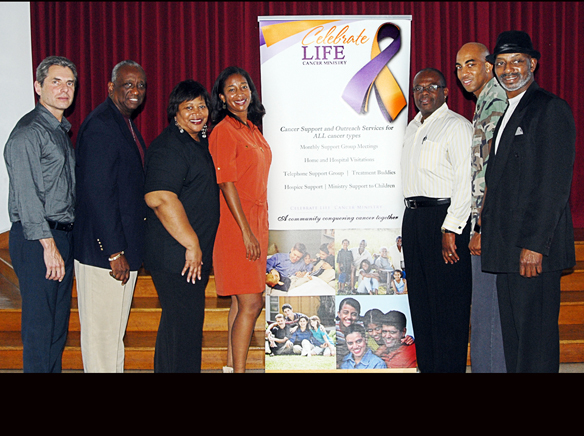A dozen organizations and countless individuals collaborated and sponsored the cancer prevention, detection, intervention and sickle cell trait (SCT) awareness workshop today at Hollypark United Methodist Church in Gardena.
Pastor Rhonda Holbert Santifer, founder and CEO of Celebrate Life Ministry pulled it all together. “Celebrate Life believes in the power of many. We create regional events and provide services with many other local cancer organizations,” the energetic Pastor said.
A dozen organizations and countless individuals collaborated and sponsored the cancer prevention, detection, intervention and sickle cell trait (SCT) awareness workshop today at Hollypark United Methodist Church in Gardena.
Pastor Rhonda Holbert Santifer, founder and CEO of Celebrate Life Ministry pulled it all together. “Celebrate Life believes in the power of many. We create regional events and provide services with many other local cancer organizations,” the energetic Pastor said.
Today was an example of this philosophy. In addition to Celebrate Life Ministry, organizations cooperating to bring this event together included Hollypark United Methodist Church, Hollypark United Methodist Men, Western Jurisdiction United Methodist Men, California Oncology Research Institute (CORI), Southern LA Patient Navigation & Wellness Center, Inner Images Mobile Mammography, Inc., Forum Medical Group, Everyone Woman Counts Program, What’z DA Count radio show, Yum-Yum Events and Catering, and the Dozier Singers Family & Friends (DSF), who performed during the opening session.
The objective was to highlight Prostate Cancer and Sickle Cell Trait Awareness Month, September, and to bring awareness to the community, focusing on African Americans. The event also stressed the importance of early detection by offering free mammograms. Speakers emphasize that early detection is the key to successful treatment and good quality of life.
Mammograms
Twenty women received free mammogram screenings today, courtesy of Inner Images Mobile Mammography, Inc. Doctors use mammogram to look for early signs of breast cancer. Regular mammograms are the best tests doctors have to find breast cancer early, sometimes up to three years before it can be felt, according to the Centers for Disease Control and Prevention.
Ronald Hurst III, MD, director of CORI, encouraged women to do self-examinations of their breast, “because no one knows your body as well as you do.” He quipped, “If women paid as much attention to their breasts as men do, they would be ok.” Attendees laughed and applauded this announcement.
Prostate Cancer
Dana Scott, MD, a urologist and founder and president of the Gold Standard Urology Group, made the prostate cancer presentation. She urged men to get tested, both ways—the prostate specific antigen (PSA) and the dreaded finger in the rear. “Both play a part in early detection before symptoms are present,” she said.
Being aware of the risk factors can help one determine an appropriate prostate cancer screening with their physician. Some common risk factors for prostate cancer include race, age, family history and lifestyle.
Race studies show that African American men are approximately 60 percent more likely to develop prostate in their lifetime than Caucasians or Hispanic men.
The risk of developing prostate cancer increases with age. While only one in 10,000 men under ager 40 will be diagnosed with prostate cancer, one in 15 men in their 60s will be diagnosed with the disease.
Men with an immediate blood relative such as a father or brother, who has had prostate cancer, are twice as likely to develop the disease. If there is another family member diagnosed with the disease, the chances of getting prostate cancer increase.
A diet high in saturated fat, as well as obesity, increases the risk of prostate cancer. Scott said that foods such as tomatoes, watermelon, guava, flax seed (three rounded table spoons per day) and green tea (2-3 cups per day) are effective in preventing prostate cancer. She cautioned that taking too many vitamins could be dangerous, even a multi-vitamin, because too many vitamins and components of multi-vitamins make the liver and kidneys work harder. “It is better to get the necessary vitamins from a well-balance diet,” she said.
Anton Bilchik, MD, PhD and co-founder of CORI said there are specific things that one can do to prevent prostate cancer: exercise (two hours per week) and get enough rest (seven to nine hours per night).
Men who use testosterone therapy are more likely to develop prostate cancer, as an increase in testosterone stimulates the growth of the prostate gland.
Sickle Cell Trait (SCT)
Sickle Cell Trait (SCT) is not a disease, but having it means that a person has inherited the sickle cell gene from one of his or her parents. People with SCT usually do not have any of the symptoms of sickle cell disease (SCD) and live a normal life.
SCT is most common among African Americans, but can a be found among people whose ancestors come from sub-Saharan Africa; the Western Hemisphere (South America, the Caribbean, and Central America); Saudi Arabia; India; and Mediterranean countries such as Turkey, Greece and Italy.
Approximately 3 million people living in the United States have SCT and many are unaware of their status.
Farron Dozier, Sgt. First, US Army (retired) nearly succumbed to the condition in 2006 after having completed a vigorous exercise routine. He grew faint and had to be rushed to the hospital. Four years
later he was still unaware of the condition until by chance and officer who had experienced some of his symptoms suggested that he get checked for SCT.
“I learned that connected with high levels of exertion SCT and a condition called Rhabdomyolysis could often trigger a muscle tissue breakdown, and even sudden death,” Dozier said.
His own research led him to articles from the 1970s that mentioned a Sudden Death Syndrome (SDS) that killed many young African-Americans during basic training. He found there was a link between SDS and the Sickle Cell Trait. “People need to know that they could drop dead without warning while playing sports or engaging in other strenuous activities.”
Today he is on a crusade to raise awareness of SCT for military personnel, athletes and young African American males in general. He hosts a weekly, online radio show call WHATZ DA COUNT, dedicated to spreading the word about SCT and encouraging individuals to get tested.
Celebrate Life Cancer Ministry provides encouragement and support for all cancer fighters, survivors and their families, whether it be man, woman or child. The services include treatment and telephone buddies, home and hospital visitation, monthly support groups and hospice support. Celebrate Life believes in the power of many. The organization creates regional events and provides services with many other local cancer organizations. It is a non-profit, health outreach organization based on the foundation of John 10:10b, “I have come that you may have life, and have that life more abundantly.”
Hollypark United Methodist Men and Western Jurisdiction United Methodist Men hosted the event and provided a continental breakfast. With headquarters in Nashville, UMM is the world’s largest, organized body of ministry to men. Its mission is to enable men to put Christ at the center of their lives; and to equip United Methodist congregations for ministry to and through men.



















